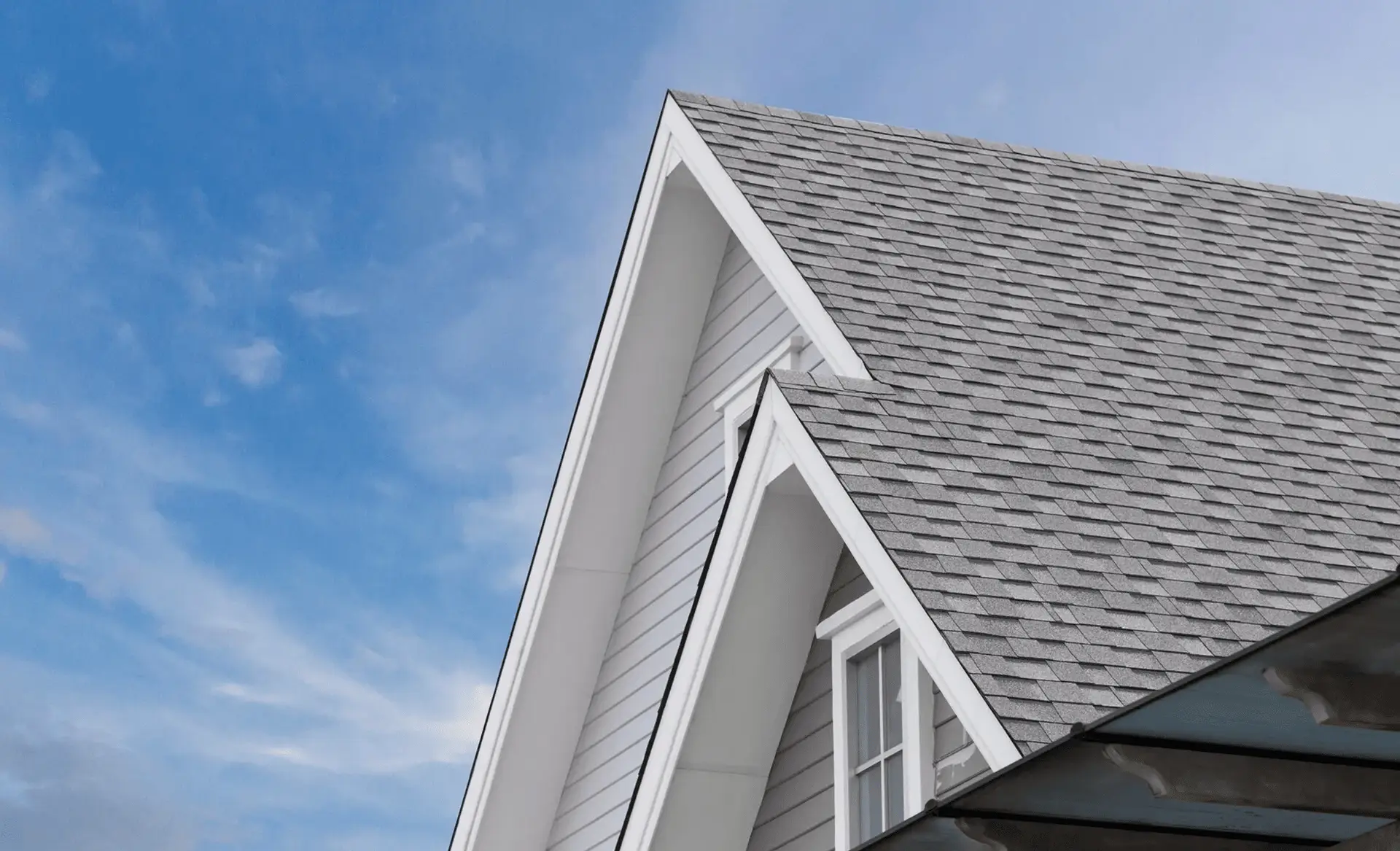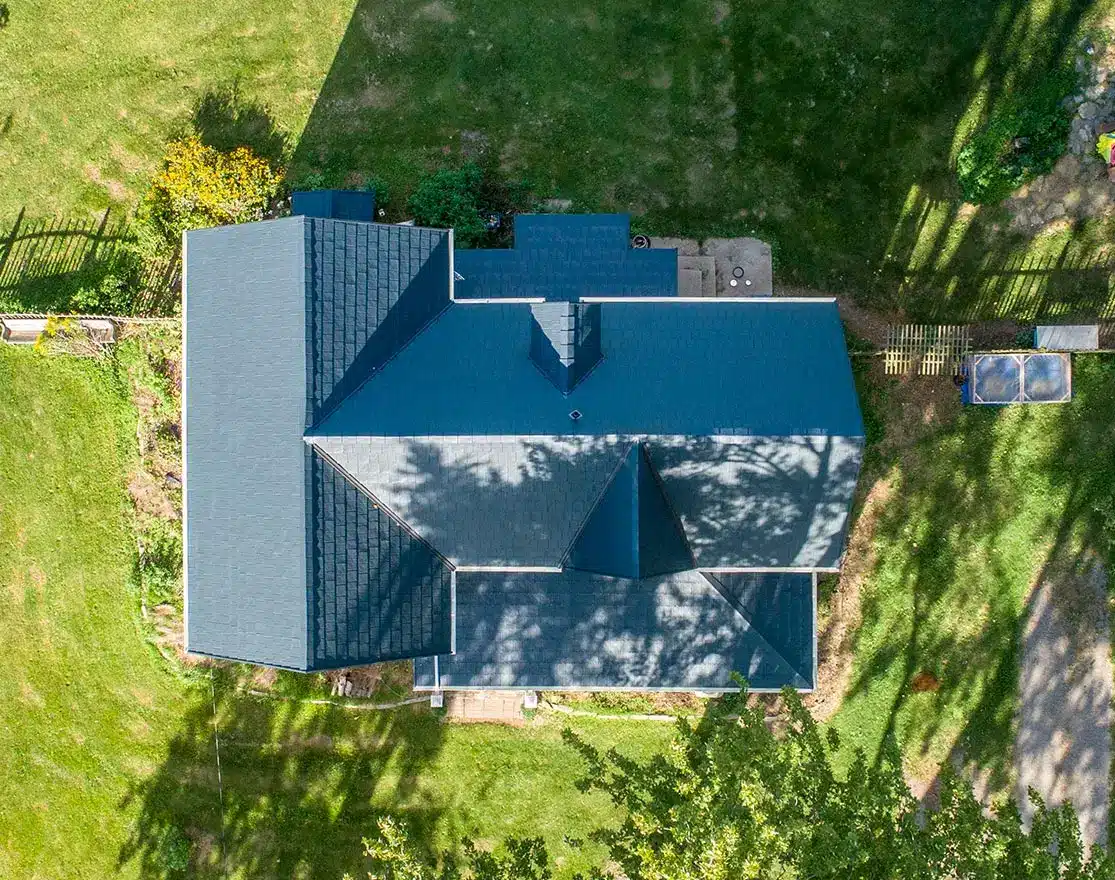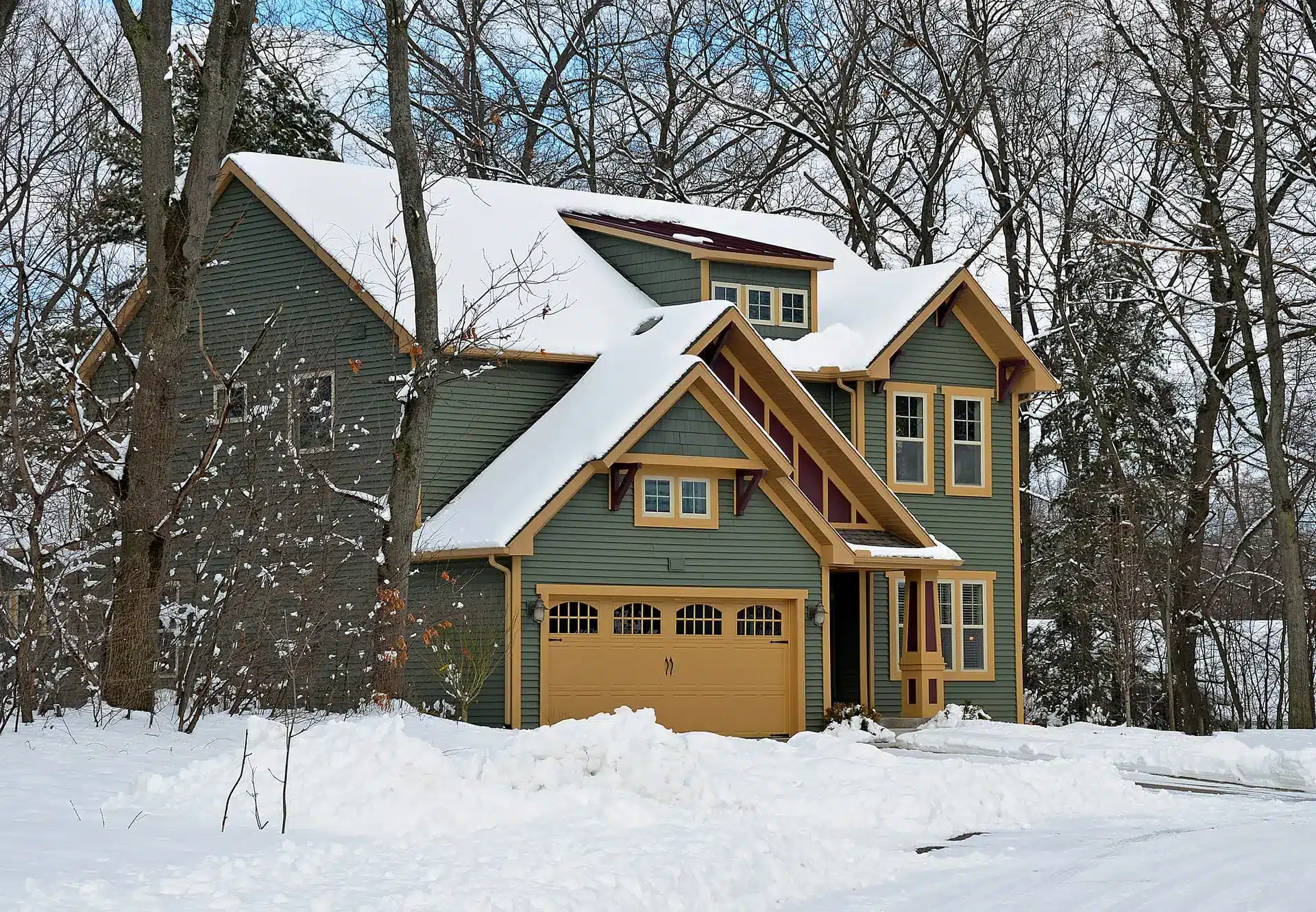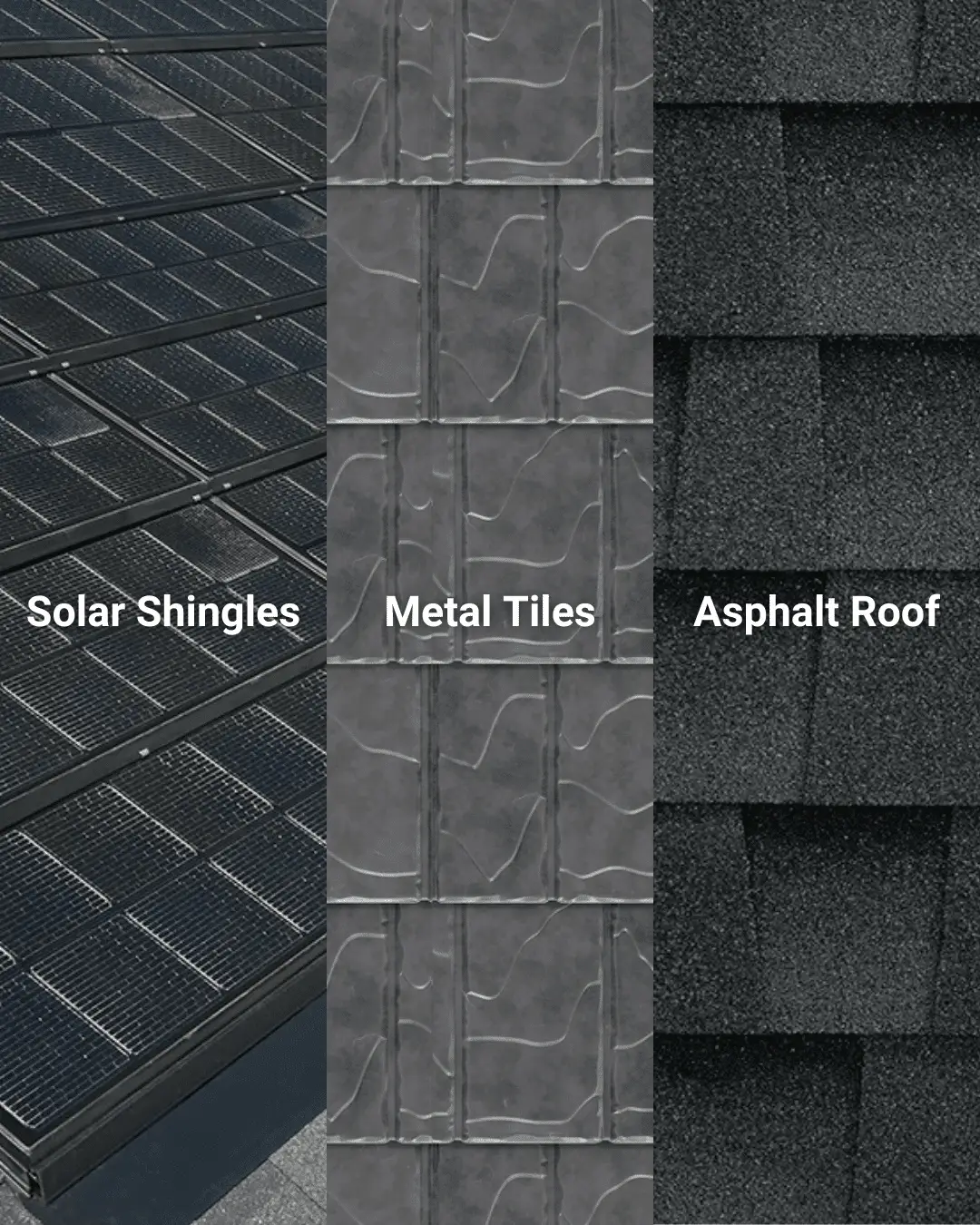Table of Contents
Are you preparing for another New England winter with energy-efficient roofing options? According to the Farmers’ Almanac 2024, it’s time to brace for a “Wet Winter Whirlwind,” with more sleet, snow, and rain than what’s typical for us. This kind of weather can wreak havoc on your home, especially the roof.
So, as you gear up for what the Farmers’ Almanac predicts, it’s the perfect opportunity to ask:
Which is more energy efficient: metal or shingles roof?
Asphalt Shingles: A Classic Look with Modern Energy Efficiency

Are shingles still a good choice if you’re concerned about energy efficiency? Absolutely!
Traditional roofing shingles have come a long way. GAF roof systems come complete with energy efficient roofing shingles that help keep your home comfortable year-round.
Modern shingles are often designed to reflect more sunlight and retain heat during colder months. For instance, energy-efficient roofing shingles certified by ENERGY STAR can significantly lower your energy bills through the seasons. Here’s what you should know:
- Increased Durability: Premium shingles are built to last longer and withstand harsher weather conditions. This means fewer replacements, less waste, and better energy efficiency overall.
- Moisture Protection: Shingles with built-in moisture barriers protect your home from costly damage caused by snow and rain, which can be especially valuable during New England winters, as predicted by the Farmers’ Almanac.
- Algae Resistance: Algae can eat away at your roof shingles, causing them to wear down and lose their durability. With algae-resistant asphalt shingles, your
While asphalt shingles might not offer the same heat-reflecting properties as metal, they still serve as a reliable and budget-friendly energy-efficient roofing choice for many homeowners.
Roof Ventilation: The Key to an Energy-Efficient Home
Whether you install metal or asphalt, one element you can never overlook is roofing ventilation. How important is roof ventilation when it comes to saving energy? Surprisingly, it’s one of the most critical components of a roof’s energy performance.
A well-ventilated roof helps maintain a balanced temperature inside your home, preventing your HVAC system from overworking.
Proper ventilation ensures that heat doesn’t build up in your attic during the summer or create ice dams in the winter.
The benefits of roof ventilation are many, including:
- Ventilation Balances Indoor and Outdoor Temperatures: Ventilation allows air to flow freely in and out of the attic space, keeping temperatures stable and reducing energy consumption.
- Prevention of Ice Dams: During the winter, ventilation prevents the formation of ice dams, which can lead to energy loss and roof damage.
- Intake and Exhaust Vents: A well-designed ventilation system combines intake and exhaust vents to ensure that hot air is expelled and cooler air circulates efficiently, benefiting both metal and shingle roofs.
Without proper ventilation, even the most energy efficient roof won’t perform to its full potential.
Metal Roofing Reflects and Insulates for Superior Energy Savings

Have you ever wondered how metal roofs contribute to energy efficiency, especially during those intense New England summers and winters? Metal roofs stand out for several reasons, and it’s not just for their sleek appearance.
Metal roofs have an impressive ability to reflect solar heat and provide insulation to keep your home warm.
Energy-efficient metal roofing typically incorporates cool roof technology, which helps reduce heat absorption. Here’s how it works:
- Cool Roof Coatings: Metal roofs are often coated with reflective materials that block UV rays, reducing heat gain by up to 40% compared to standard shingles. This leads to lower air conditioning costs in the summer.
- Airspace Insulation: Metal roofs are designed with a gap between the roof deck and the metal, creating a natural barrier that limits heat transfer, improving insulation.
- Long-Lasting Durability: Metal roofs have a lifespan of 40-70 years, making them a sustainable choice that requires less replacement and maintenance over time, further contributing to energy efficiency.
These features make metal roofing one of the most energy efficient roof options in New England. This is especially true for areas prone to hot summers and cold winters.
Which is More Energy Efficient – Metal or Shingles Roof?
So, which is more energy efficient–metal or shingles roof? Both options offer superior performance and long-term energy savings.
- Energy Star Certification: Both energy-efficient metal roofing and shingles can be ENERGY STAR certified–but metal roofs offer superior solar reflectance and heat dissipation.
- Durability: Metal roofs last decades longer than shingles, meaning fewer replacements and less environmental impact. Over its lifespan, a metal roof tends to save more on energy bills.
- Cost vs. Savings: While metal roofs have a higher upfront cost, the savings in energy bills over time often make up for it.
- 6-Layer Roofing System Enhances Home Performance: GAF Roofing systems are designed in 6 layers,
Durability and Protection in Severe Weather

Are you ready to deal with the heavy loads of wet snow predicted by the Farmers’ Almanac 2024? Both metal and shingle roofs offer protection, but metal roofing often fares better in extreme weather conditions, which can ultimately impact energy efficiency.
Stay protected from winter’s wrath with metal or shingles roofing:
- Snow and Ice: Metal roofs shed snow and ice more easily than shingles, reducing the risk of buildup and moisture damage that could lead to energy loss.
- Wind Resistance: Metal roofs are highly resistant to high winds, which can be especially valuable during storms. Meanwhile, GAF asphalt shingles come with an Unlimited Wind Speed Warranty, promising that your shingles will stay in place no matter the severity of the wind storm.
- Weight: Metal roofs are lighter than shingles, which reduces the strain on your home’s structure and insulation. Wet snow, which is up to four times heavier than fluffy snow, poses a significant challenge that metal roofs handle more efficiently.
What About Solar Shingles?
When you think about solar energy, you probably picture large, bulky panels attached to the roof, but solar shingles are a game-changer. These sleek, modern shingles serve the same purpose as traditional solar panels while blending seamlessly into your roof.
With more homeowners in New England exploring energy-efficient roofing options, solar shingles offer an ideal solution for improving your home’s energy performance while maintaining curb appeal.
Solar shingles are designed to mimic the look of conventional roofing materials while generating electricity from the sun. Made from thin-film solar cells composed of copper indium gallium selenide (a semiconductor), they convert sunlight into usable energy for your home.
Not only are they aesthetically appealing, but they are also an efficient, eco-friendly roofing option for those looking to harness renewable energy without sacrificing style.
New England Homeowners are installing solar shingles for their:
- Seamless Aesthetic: Unlike traditional solar panels, solar shingles replace a portion of your roof, giving them a sleek, integrated look that blends with your existing roofing.
- Energy Savings: Save up to 100% on your energy bills when you install solar shingles!
- Durability: These shingles are made to withstand harsh weather conditions, offering the same protection as conventional roofing materials.

The Right Roof for Your New England Home
The right roofing material can make all the difference in your home’s performance. After all, roughly 30% of your home’s energy is lost through the roof.
If you aren’t sure of which material to choose, call us today at Coastal Windows. We’re local GAF Master Elite Roofing contractors, with only 3% of roofers earning this prestigious title! Trust us to install energy efficient roofing options for your New England home. Seasonal promotions and 0% interest-free financing is available now!


